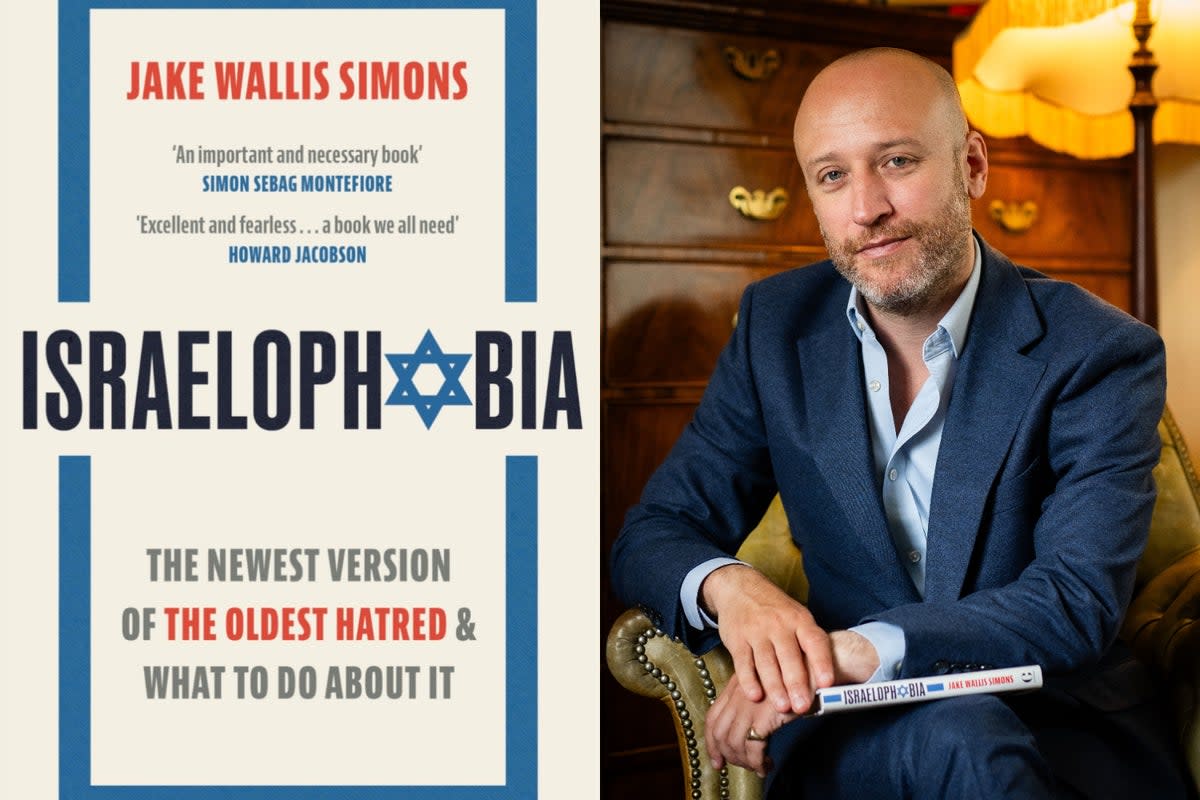Israelophobia review: Is Israel treated differently? Yes and that should shame us

If your starting position is that Israel has no right to exist – to “push it into the sea” as the Iranian regime charmingly puts it – this probably isn’t the book for you. Israelophobia by Jake Wallis Simons is not a simple defence of Israel, nor an attempt to deny its responsibilities in the tragedy of Israeli-Palestinian relations, but an examination of the way Israel has been weaponised in the culture war by an evolving strain of antisemitism. As editor of The Jewish Chronicle, Wallis Simons’ perspective is not unexpected and his thesis is to link the spike of antisemitism in the West to attitudes towards Israel, the roots of which stretch back centuries.
Why shouldn’t you be able to criticise Israel without being called antisemitic? Well, you can. Millions of people do every day. Israelis do too – they criticise their government and its policies. Israelophobia, as defined here, is a coalition of enmities disguised as political activism and tolerated by a section of western society who single Israel out for infamy or “making the old bigotry palatable to the mainstream”. The book argues that the progressive left has co-opted anti-Israel militancy into a menu of social justice issues – “luxury beliefs” – so that Israel takes its place beneath the worst regimes in the world. The evidence for Israel’s villainous reputation (political violence, discrimination etc) bears little comparison to China, Iran, Syria and tens of other nations, let alone the historical crimes of the US, Britain, Germany and Russia.
By mixing the shibboleths (a nice Biblical term) of identity politics with far-right myths, language has been co-opted to such an extent that not only is Israel a “colonial power”, an “occupier”, a “white supremacist” state and an “apartheid” state, but that to not accept these truths is to be cast out of polite society. The assumption that the so-called Zionist lobby (“Zionist” is now interchangeable with “Jew” and “racist”) pressures western governments to suppress the truth of Israeli oppression is the same conspiratorial nonsense as the fascist and Soviet trope of the Jewish spider controlling the world’s governments. The links between this rhetoric and a vandalised synagogue in Manchester, bullied students or abused Jewish schoolchildren on a London street are obvious.
Wallis Simons argues there is an attempt to delegitimise Israel by factions of the Left who have found strange bedfellows among Islamic fundamentalists. If the West is their common enemy, Israel is the West’s colonial beachhead. It does not belong there. How this plays out elsewhere is obvious. To be Jewish is to be guilty by association.
The proposal that Israel should be judged the same as any other country is true on paper, but as the old football saying goes, the game’s not played on paper. The globe may be riddled with ethnic conflicts and boundary disputes as Wallis Simons points out, but Israel is not like any other country for the complex religious, historical and geopolitical reasons that elude some of its more ill-informed enemies.
Wallis Simons’ use of bar charts for comparison with other flashpoints (conflict deaths, people displaced etc) can feel a little crude, but he is more sophisticated in showing how even after 75 years of Israel’s existence it is still perceived as “the other” just as Jews have so often been perceived elsewhere. It’s common for people to display unequivocal support for immigrants and refugees yet perceive Jewish immigration to Israel – usually a response to antisemitism – as parasitical or aggressive. His explanation of how the incitement and smears of Nazi and Cold War propaganda still poisons the discourse about Israel is convincing and disturbing.
This book is particularly timely when Israel itself is so divided, with a secular majority in a standoff with the Netanyahu government and the intransigent religious right that props it up. Wallis Simons is open about its institutional failings but makes a convincing exposé of the convenient line that attacks on Israel can be easily separated from antisemitism. He says Jewish communities get the distinct impression that for the most zealous anti-Israeli campaigners, “It’s not about the Palestinians, it’s about the perpetrators.”
Across Britain, the US and Europe antisemitism has been rising steadily over the past 20 years, reaching a peak here in 2021. The tone of anti-Israeli activism adds a fresh element to the bigotry Jews outside Israel experience. It would be controversial to shout, “Wipe out the Jews” at a rally in London (though some do) but very easy to shout, “From the river to the sea”. For, Jewish people, with their historical experience, they sound like the same thing.
Israelophobia by Jake Wallis Simons is on sale now (Little Brown, £12.99)
George Chesterton is excecutive editor of the Standard


